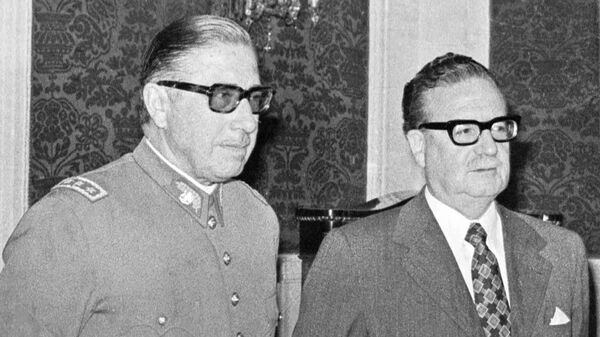On 11 September 1973, 47-years ago today, a radical democratic movement that swept to victory in Chile just 3 years before was destroyed in a single night.
The hopes and dreams of millions of Chileans were drowned in blood by a United States-backed military overthrow of Santiago's elected left-wing president, Salvador Allende.
Allende, a Marxist who helped found the Chilean Socialist Party, stood in numerous elections as a candidate for Popular Unity (PU) - an alliance of socialists, the Communist Party, and other left-wing organisations.
His platform was developed amid a backdrop of political polarisation and widespread working-class discontent. By 1970, the country had become embroiled in thousands of strikes and land seizures, involving hundreds of thousands of people.
On Sept 11 1973, a CIA-backed coup overthrew Chile's democratic socialist president Salvador Allende & worked to install Gen. Pinochet's brutal dictatorship, who killed thousands, tortured tens of thousands & imprisoned over 130,000. pic.twitter.com/pjaEme54qF
— American Values (@Americas_Crimes) September 10, 2020
The Christian Democrat (CD) reformist president, Eduardo Nicanor Frei Montalva, who won the 1963 election by pitching himself to the middle classes as the only alternative to Marxism, had promised to end the economic problems that plagued the country, including stagnation and widespread unemployment. He also offered to “Chileanize” the economy by taking the US-owned copper firms into national ownership.
Very little changed, however, and popular pressure pushing the representatives of Chilean capital to the left led to a slim victory for Allende in the 1970 election, with 37 percent of the vote, forcing his left-wing alliance to rely on support from the Christian Democrats.
As a precondition for his ascension to office, the CD party demanded Allende sign a “Statute of Guarantees”, preventing him from making any sweeping changes to the state, the legal system, and, fatally, the armed forces.
Radical Democracy
Despite the structural handicaps of an uneasy coalition and an inherited and decrepit economy, the PU government did embark on sweeping reforms.
The Allende government quickly nationalised the US-dominated copper industry, which accounted for three-quarters of the country's exports. He brought banking and the financial sector into public ownership, as well as 91 other industries, in his first year alone. The PU also embarked on diversification projects to unlink the economy from its reliance on copper, one of which included an embryonic version of the internet.
Project Cybersyn; Chilean project from 1971–73 during the presidency of Allende aimed at constructing a distributed decision support system to aid in the management of the national economy. pic.twitter.com/2TVPRCcCRu
— Post-Comprehension📼 (@RGravare) September 11, 2020
This experiment in democratic socialism looked to use its limited powers to restructure the economy and provide a more equal distribution of national resources - policies which received massive support from the working class and poor but scorn from the middle and wealthy classes, who hitherto had been the primary beneficiaries of state policy.
Allende oversaw an economic boom in his first year. He succeeded in reducing unemployment, improving income equality, an average increase in real wages of 22%, and reduced inflation from 33% to 19%. In a reflection of their popularity, the 1971 municipal elections saw the PU received 50% of the vote.
'Make the Economy Scream'
Despite the achievements, hyperinflation soon returned, and in 1972, the Chilean Escudo became next to worthless. In an attempt to address the problem, Allende sought to introduce anti-inflationary policies through tax increases on the wealthy but was blocked by an opposition-dominated congress.
The problem was not purely home grown. In Washington, the administration of US President Richard Nixon, and his national security advisor, Henry Kissinger, would never accept the election of an overtly Marxist president and rejected the government's legitimacy.
"I don’t see why we have to let a country go Marxist just because its people are irresponsible", Kissinger stated.
The imperialists tried to prevent him from taking office, even killing a general to help foment a coup before Allende was sworn in. During his time in office, they tried to overthrow him every single day. The military - under Pinochet - was given authority to take him out. pic.twitter.com/8HzpWezT9x
— Vijay Prashad (@vijayprashad) September 11, 2020
As part of its Cold War strategy against the Soviet Union, the United States pursued a policy of sabotaging the Allende government. Throughout 1972 and 1973, the Central Intelligence Agency (CIA) funneled money to labour organisations and trade unions to take strike action and harm the economy.
According to sources in the New York Times, the CIA made direct cash payments to shopkeepers, taxi drivers and others, which led to widespread disruption. In a kind of middle-class general strike, 250,000 truck drivers and other professionals created an economic downturn that set the foundations for the coup.
In 1970, in an effort to "prevent Allende from coming to power or to unseat him", Nixon had ordered the CIA to "make the economy scream".
That same year, two military officers, supplied by United States intelligence, assassinated General René Schneider in a botched kidnapping after the nationalist commander-in-chief of the Chilean military rejected the idea of preventing Allende from taking office through the use of military force.
How the @nytimes and @TheEconomist covered what we now know was a military coup against Allende in Chile in 1973.
— Aaron Bastani (@AaronBastani) January 29, 2019
Looks eerily similar to #venezuela today.
Via @cuttlefish_btc pic.twitter.com/uVKVhXQllD
Despite the internal and external crippling of the economy and multiple incidences of sabotage, Allende increased his share of the vote to 44% in the March 1973 election.
While he was unable to reform the military, one of Allende's last moves, prior to his ouster, was bringing two generals into his own cabinet after losing the support of the CD.
The Chicago Coup & After Allende
The London-based newspaper 'The Socialist Worker' at the time predicted that the same military that had repressed striking workers "would not sit by and let the ruling class be voted out of existence".
On 11 September 1973, General Augusto Pinochet and the military, supported by the US and using fighter jets purchased from the UK, besieged the presidential palace.
Before taking his own life, Allende issued a final address to his country.
"Other men will overcome this dark and bitter moment when treason seeks to prevail. Keep in mind that, much sooner than later, the great avenues will again be opened through which will pass free men to construct a better society. Long live Chile!"
Salvador #Allende, the elected socialist president of #Chile makes his final speech hours before his death, #OnThisDay in 1973.
— Durham Miners' Association (@DurhamMiners) September 11, 2018
His government was brutally overthrown in military coup. Thousands more socialists were murdered as a fascist junta led by Augusto Pinochet took power. pic.twitter.com/fosTim7N2C
Following his overthrow, civilian rule ended and a long-running military dictatorship was established. During the nearly three decades of Pinochet's tyranny, at least 30,000 people were murdered and thousands more tortured and imprisoned in concentration camps.
Economic gains were also reversed. The junta invited Milton Friedman's 'Chicago Boys' to serve as economic advisors and, freed from the shackles of accountability, implemented a destructive neoliberal experiment in privatisation and deregulation.
September 11th in Chile is always one of the toughest days of the year.
— Adam Brandon (@AdamBrandon84) September 11, 2020
Today marks 47 years since the bloody military coup backed by the USA/CIA & led by Pinochet overthrew a democratically elected socialist government.
The Estadio Nacional was used as a concentration camp. pic.twitter.com/VnZfWaDuV7
After just ten years of free-market policies, unemployment had reached 22%, real wages declined by 40%, and productivity dropped. By the end of Pinochet's rule in 1990, Chile saw a 45% poverty rate.
Despite the Pinochet regime being overthrown by popular pressure and democracy eventually restored, many of the military government's policies became enshrined in the country's constitution, outlawing any serious attempt to reassert the state sector over the economy, leading to the outburst of discontent seen in Chile today.

Lessons for the Left
The acclaimed poet Pablo Neruda, a personal friend of Allende and likely murdered by the Pinochet regime, wrote: "You can cut all the flowers but you cannot keep Spring from coming".
The Chilean experience is not unique. From Mossadegh in Iran, the overthrow of President Sukarno in Indonesia, the toppling of Jacob Árbenz in Guatemala on behalf of the US-based United Fruit Company, the removal of democratically-elected governments to protect corporate interests in the United States has become a historical cliche that would be laughable were it not so genocidal.
The same tactics of economic strangulation are being employed today by the Trump administration and its sanctions against the elected Maduro government in Venezuela.

A question is raised, however, of how does one maneuver an opposition that has no intention of playing by the rules? Even in developed first-world democracies, those who propose a radical redistribution of wealth are structurally crippled.
Recent examples include the US Democratic Party rallying to stop Bernie Sanders from being the 2020 presidential nominee. In the UK, leaked internal documents indicate that the Labour Party was actively working against its own election victory to prevent Jeremy Corbyn from becoming prime minister. This came amid active threats from the Trump administration that the US would cease information sharing with the UK if a left-wing government was elected.
Following the 1917 Russian revolution, the introduction of 'War Communism' saved the fledgling socialist state from being overthrown by the White Army and an invasion coalition which included the United States and the former British Empire.
Much criticism is made of the heavy-handedness of the so-called 'actually existing socialist' movements that secured power in Russia, China, Cuba, and other countries throughout the 20th century but, without exception, these revolutions were subject to constant sabotage, blockade, and subversion, similar to recent events in Chile.
For a revolution to succeed, it must do more then merely win power. If it is to survive, it must be actively defended. This is the lesson the left needs to take on board. Lenin knew his palace would be besieged, and Allende invited the generals inside.
There's a reason why every progressive on earth knows the name of Augusto Pinochet - as he won his battle - and almost no one has heard of Admiral Kolchak - who lost.



